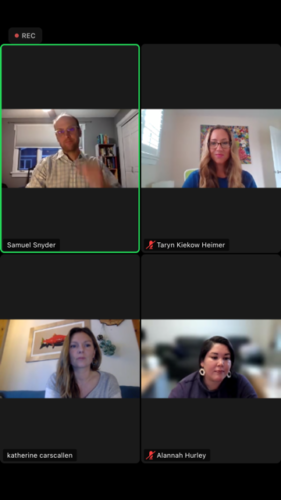More On Bristol Bay Protection Possibilities After Court Ruling

A Monday morning press briefing discussed last week’s Federal District Court ruling that opened the door for more permanent protections for the Bristol Bay region. Participants included Alannah Hurley, executive director of United Tribes of Bristol Bay, Katherine Carscallen, executive Director of commercial Fishermen for Bristol Bay, and Taryn Kiekow Heimer, deputy director, Marine Mammal Protection Project for Natural Resources Defense Council.
From the Bristol Bay Defense Fund:
Washington, DC/Alaska — Friday, in a critical step forward in providing permanent protection to the Bristol Bay watershed and vetoing the Pebble Mine, the Federal District Court officially cleared the Environmental Protection Agency (EPA) to reinitiate the Clean Water Act 404(c) process that would allow for the agency to protect Bristol Bay. In this decision resolving the lawsuit Bristol Bay Economic Development Corporation et al. v. Pirzadeh et al., the court vacated the previous decision by the Trump administration to withdraw proposed protections for Bristol Bay and remanded the action back to the agency to resume the process.
This milestone moves one step closer to permanently protecting this unique landscape, which produces more than 50% of the world’s supply of wild-caught sockeye salmon, supports tens of thousands of jobs, and is home to some of the last intact salmon-based tribal communities in the world.
This is just one step in the process. The Biden administration can now resume the 404(c) process. However, the shape that process takes will determine whether or not Bristol Bay is fully protected from dangerous mining. We urge the EPA to ensure the fishermen, residents, and Tribes who depend on the bay don’t have to fish another season under the existential threat of the Pebble Mine, and finish the job and complete the 404(c) process by June 2022.
“This is a historic step forward in the long fight to protect Bristol Bay, our fishery, and our people,” said Alannah Hurley, Executive Director of United Tribes of Bristol Bay. “The fifteen federally recognized Tribes of the United Tribes of Bristol Bay who call this region home, have worked for decades to protect our pristine watershed that sustains our sacred indigenous way of life. It is critical for the EPA to act quickly and finish the job of protecting our lands and waters before the start of the next fishing season.”
“The science is clear and overwhelming – development of the Pebble Mine would irreversibly damage the Bristol Bay watershed, the greatest salmon stronghold left on earth and tens of thousands of people who depend on it for their livelihoods,” said Katherine Carscallen, Executive Director of Commercial Fishermen for Bristol Bay. “Bristol Bay’s Tribes and fishermen have spent decades fighting to protect their way of life and a $2 billion sustainable economy, it’s time to finally end this threat. EPA must act with urgency, applying the Clean Water Act to veto Pebble Mine before the next summer fishing season.”
“It’s been ten years since the Tribes of Bristol Bay asked EPA to stop the Pebble Mine,” said Joel Reynolds, Western Director and Senior Attorney at the Natural Resources Defense Council. “With the federal court remand, the agency is now positioned to grant that request by permanently protecting the watershed that feeds Bristol Bay. It’s a national treasure, the Fort Knox of wild salmon on Earth, and the time is now for EPA to finish the job – for good.”
The court action officially reinstates 2014 proposed protections for Bristol Bay and paves the way for the Biden administration to fulfill their campaign commitment to doing “what President Trump has failed to do: listen to the scientists and experts to protect Bristol Bay — and all it offers to Alaska, our country, and the world.” The court’s action reverses the Trump administration’s 2019 decision to throw out the protections in the PD and end the 404(c) process. As claimed by Tribes and other Bristol Bay communities, the 2019 decision was arbitrary, not based on science, and flew in the face of longstanding requests by Tribes and others for permanent protections for Bristol Bay’s headwaters.
The Biden administration and EPA Administrator Regan can now make significant progress to fulfill their commitments respecting Tribal sovereignty, following the science, and quickly acting to protect this pristine landscape. They promised to protect Bristol Bay and today, this is a step towards keeping that promise.
The Bristol Bay Defense Fund and partners, lead by United Tribes of Bristol Bay, has urged the administration to “Finish the Job,” throughout the year, and the agency’s announcement comes after letters and ads requesting action from stakeholders across the political spectrum, including Tribes, sport and commercial fishermen, conservationists, and others. The 404(c) ‘veto’ is a critical part of the strategy to provide permanent protection that also includes the goal of Congressional legislation to further codify protections of this special place.
The Tribal-led fight to protect Bristol Bay began more than a decade ago in response to the proposed Pebble Mine located at the Bay’s headwaters. Pebble Mine would be the largest open-pit mine in North America, producing more than 10 billion tons of toxic waste that will remain there forever. As reported in the New York Times, Bristol Bay is a bright spot amid devastatingly low catches in other salmon communities. But even the catch in Bristol Bay is at risk from the dangerous Pebble Mine. Northern Dynasty Minerals CEO Ron Thiessen — the head of the company behind the Pebble Mine proposal — recently said “we have by no means given up on this project” amid bipartisan public opposition. EPA’s action provides hope that this threat will not loom over the region indefinitely. This time, however, the job must be finished.
In Case You Missed It: NowThis recently covered the fight to protect Bristol Bay, featuring an interview with Katherine Carscallen — Executive Director of Commercial Fishermen for Bristol Bay — who called on the agency to finish in this timeline.



